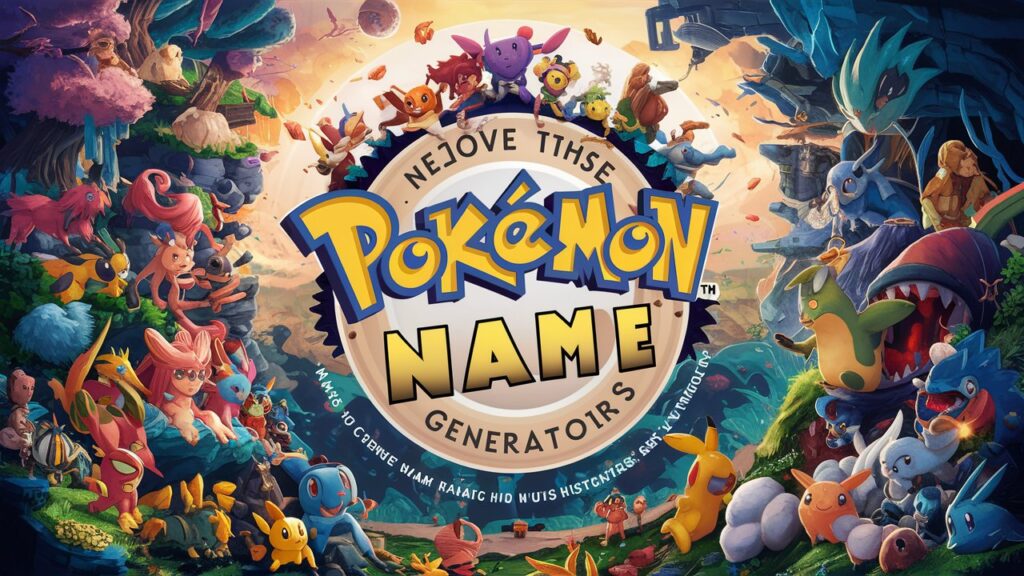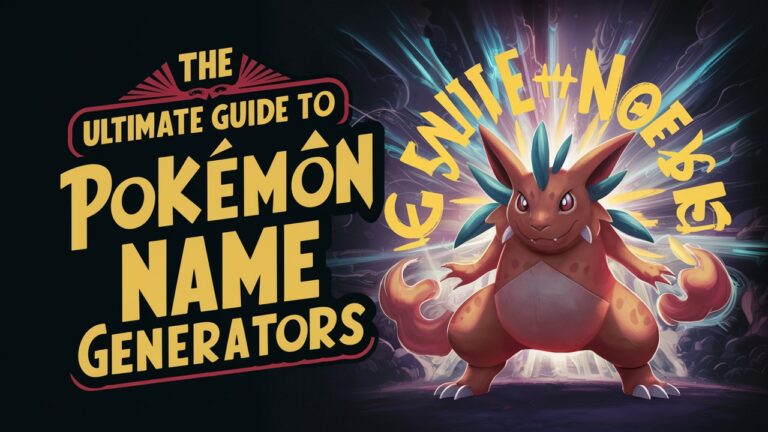Introduction
In the expansive universe of Pokémon, every creature’s name carries a spark of magic—a fusion of whimsy, biology, and cultural flair. Whether you’re a game developer designing a new region, a writer crafting fan fiction, or a tabletop RPG enthusiast world-building, a Pokémon name generator becomes an indispensable tool. These generators transcend basic randomization; they encapsulate linguistic patterns, elemental themes, and creative nuances unique to the Pokémon franchise. This article delves into the mechanics, creative potential, and practical applications of Pokémon name generators, empowering you to conjure names that resonate with authenticity and charm.
What is a Pokémon Name Generator?
A Pokémon Name Generator is a specialized algorithm or tool designed to produce fictional creature names inspired by the iconic naming conventions of the Pokémon universe. Unlike generic fantasy name generators, it incorporates elements critical to Pokémon lore: elemental affinities (Fire, Water, Psychic), animal or plant inspirations, pun-driven wordplay, and cultural motifs (Japanese, English, or hybrid linguistics). These tools often use databases of prefixes, suffixes, and thematic keywords—like “Volt” for Electric-types or “Moss” for Grass-types—to assemble names that feel cohesive with existing Pokémon. Advanced generators may even analyze syllable patterns from classics like “Charizard” (Char + lizard) or “Bulbasaur” (Bulb + dinosaur), ensuring outputs mirror the franchise’s playful yet logical style.
Why Use a Pokémon Name Generator?
The value of a Pokémon Name Generator extends far beyond convenience. For content creators, it eliminates creative block by providing hundreds of plausible names in seconds, allowing focus on broader narrative or game design. For fans, it deepens engagement—generating names for original Pokémon, regional variants, or “Fakemon” enriches role-playing adventures or fan art. Educators also leverage these tools to teach linguistics, demonstrating how portmanteaus (e.g., “Pikachu” = pika [electric spark] + chu [mouse squeak]) blend sound symbolism with meaning. Ultimately, these generators preserve the authentic “Pokémon feel”: names that are catchy, evocative, and linguistically consistent, whether you’re naming a crystalline Ice-type or a mischievous Ghost-type.
How Pokémon Name Generators Work
At their core, Pokémon Name Generators operate through rule-based algorithms or machine learning models. Rule-based systems use predefined libraries: a “Fire-type” module might combine prefixes like “Ember-” or “Blaze-” with suffixes like “-torch” or “-kin,” yielding names such as “Embertorch” or “Blazekin.” Machine learning models, conversely, train on datasets of existing Pokémon names to identify patterns in phonetics, length, and thematic relevance. For instance, they learn that Grass-types often use soft consonants and floral terms (“Shaymin,” “Roserade”), while Steel-types favor hard sounds and mechanical terms (“Klinklang,” “Lucario”). Some generators incorporate user inputs—selecting a type, habitat, or aesthetic (e.g., “cute,” “ferocious”)—to tailor results. This synergy of structured rules and adaptive learning ensures names aren’t just random but lore-compliant and inventive.
Top Features of an Effective Pokémon Name Generator
The best generators prioritize customization, diversity, and thematic integrity. Key features include:
- Elemental Filters: Allowing users to generate names for specific types (e.g., a Water-type generator might output “Marinara” [marine + aura] or “Coralurk” [coral + lurk]).
- Style Templates: Options for “cute,” “mythical,” “robotic,” or “ferocious” to align with a Pokémon’s demeanor.
- Syllable Control: Letting users define name length (e.g., 2–4 syllables) to match existing Pokémon cadences.
- Language Fusion: Blending Japanese, English, or Latin roots (e.g., “Yuki” [snow] + “fang” = “Yukifang” for an Ice/Dog-type).
- Offline Accessibility: Downloadable databases for writers or developers working without internet.
Tools lacking these features risk generic outputs—imagine a Dragon-type named “Fluffy” instead of “Dracothorn.”
Creative Applications Beyond Gaming

While Pokémon games are the obvious use case, these generators fuel creativity across domains. Authors world-building sci-fi/fantasy stories repurpose them for alien creatures or magical beasts. Marketing teams brainstorm product names with Pokémon-esque memorability (e.g., a solar-powered gadget dubbed “Solvolt”). Tabletop gamers craft custom creature stat blocks paired with generated names for immersive campaigns. Even children’s educators use them in storytelling exercises to teach portmanteau creation. The generator’s true power lies in its flexibility: a name like “Glimmernook” (for a Fairy-type) could inspire an entire character design—sparkling wings, hidden forest habitats, and mischievous lore.
Ethical Considerations and Copyright
While Pokémon Name Generators encourage creativity, respecting intellectual property is crucial. Legally, fan creations using generated names are permissible under non-commercial fair use, but monetized projects (games, merchandise) risk infringement if names resemble trademarked Pokémon (e.g., avoiding “Pikablu” for an Electric/Water-type). Ethically, creators should acknowledge inspiration from the Pokémon universe without implying official endorsement. Generators should also avoid appropriating cultural terms without context—e.g., using Māori or Indigenous words superficially. Opt for tools that prioritize originality and provide disclaimers about trademark boundaries.
Conclusion
A Pokémon Name Generator is more than a whimsical gadget—it’s a bridge between algorithmic ingenuity and human imagination. By demystifying the linguistic alchemy behind names like “Sylveon” or “Garchomp,” these tools empower fans and creators to contribute their own voices to a beloved universe. Whether you’re sketching a Grass/Poison-type mushroom creature or coding an indie game, let generators spark the first ember of creativity. Remember: the perfect name isn’t just a label; it’s the soul of your Pokémon.
Frequently Asked Questions (FAQs)
Q1: Are Pokémon Name Generators free to use?
Most online generators are free, but premium versions (e.g., integrated into game design software) may charge for advanced features like AI-driven customization or bulk exports. Always check licensing terms.
Q2: Can I trademark a name created with a generator?
Trademarking is possible if the name is wholly original and unrelated to existing Pokémon. Consult a legal expert to avoid conflicts with Nintendo’s trademarks.
Q3: How do I ensure my generated names feel “authentic”?
Study existing Pokémon etymology. Combine relevant animal/plant terms with elemental words (e.g., “Vine” + “Fang” for a Grass/Dark-type). Avoid overcomplication—most Pokémon names are 3–4 syllables max.
Q4: Do generators work for regional variants or evolutions?
Yes! Input base traits (e.g., “Ice-type Vulpix variant”) to get names like “Frostix” or “Glaceonix.” Some tools even suggest evolutionary lines.
Q5: Can I contribute to a generator’s database?
Open-source generators (like those on GitHub) often welcome user submissions. Share your creative word roots or suffixes to enrich the algorithm!
Q6: What if the generator produces a name that already exists?
Reputable tools cross-check outputs against official Pokémon databases. If a match occurs, tweak your filters (e.g., change type or syllable count) for unique results.
Q7: Are there generators for Pokémon moves or locations?
Absolutely! Many tools expand to move names (e.g., “Aqua Blitz” for a Water-type attack) or towns (e.g., “Petalfall Village”).
Q8: How can I use these names without copyright issues?
For non-profit projects (fan art, RPGs), credit Pokémon as inspiration. For commercial use, create wholly original creatures with distinct designs beyond the name.
Unleash your inner Pokémon Professor—start generating, and let every name tell a story! 🎮✨
